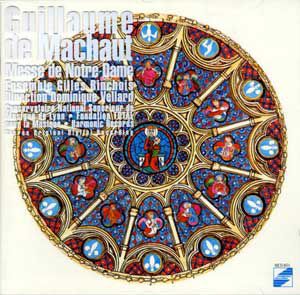|
|
Search MusicWeb Here |
|
 |
||
|
Founder:
Len Mullenger (1942-2025) Editor
in Chief:John Quinn
|
|
|
Search MusicWeb Here |
|
 |
||
|
Founder:
Len Mullenger (1942-2025) Editor
in Chief:John Quinn
|
 |
Guillaume de MACHAUT
(c.1300-1377) Messe de Notre-Dame Ensemble Gilles Binchois Rec Saint-Martin Collegiate Church, Champeaux, France, 5-9 September 1990 DDD |
| CD available for post-free online mail-order or you may download individual tracks. For some labels you can download the entire CD with a single click and make HUGE savings. The price you see is the price you pay! The full booklet notes are available on-line. | |
|
NOTE • Click on the button and you can buy the disc or read the booklet details • You can also access each track which you may then sample or down load. • Further Information. |
|
|
Machaut’s great Messe de Notre-Dame (Mass of Our Lady) could easily lay claim to be the first seminal masterpiece of Western music. Its immediate influence was felt for at least the next hundred years, and as recently as the 1980s contemporary giants such as Birtwistle and Boulez were again pointing to its ongoing inspiration. Chief aspects of importance are its almost mathematical precision regarding unifying structures, its justified claim to be the first complete cyclic setting of the Mass, and the austerely beautiful sound-world Machaut conjures up from seemingly simple methods.
The manuscript source has occupied scholars for generations, and producing performing editions of music over six hundred years old will always generate controversy. There are currently a dozen or so excellent recordings of this amazing music, and (having heard at least five or six) no two recordings appear to be alike. Some adopt a relatively ‘safe’ approach (Summerly on Naxos, the Hilliards on Hyperion), preferring to let the music speak for itself, others (notably the outrageous but absorbing Ensemble Organum, under their flamboyant director Marcel Peres, on Harmonia Mundi) are more interventionist. On the whole, the present issue falls into the former category, though even here there are differences from other discs I’ve sampled. For a start, Dominique Vellard opts to include the plainchant interpolations between repeated sections of the various Ordinary movements. He also, more interestingly, ‘fleshes out’ the whole piece with introits, graduals and alleluias, effectively reconstructing a whole service rather than just giving us the usual five sections of the Ordinary. This has the overall effect of putting the famous sections into a sensible context, and in so doing allowing their originality to emerge to even more startling effect.
As far as the rendition of those famous sections goes, it is, as I say, on the steady and safe side, with the main aim being a homogeneity of tone and ensemble This is compromised slightly, at times, by one Andreas Scholl (no less), whose piercing, vibrato alto sticks out a little too much from the general texture. Given the beauty of the voice, however, this may bother others less than me. It may even have been exploited in a more adventurous way, as Marcel Peres has shown. He opts for a freely spontaneous approach, letting his upper-line soloist meander and improvise in a vocalise fashion. The result is a highly individual, almost Arabic flavoured sound that at first sounds anything but ‘authentic’ (whatever that may be), but is so infectious as to make the other versions seem a tad straight, or even boring. One version which effectively combines the two approaches is by the Taverner Consort on EMI; Andrew Parrott adopts a lower pitch (down a fourth, as does Peres) which immediately gives the music a darker quality that is apt; he also uses plainchant interpolations, some of which are quite florid. This serves two purposes – to remind the listener of the cantus firmus on which the section is based, and also to lend some of the soloistic freedom to the proceedings that make the Harmonia Mundi disc so effective.
Having mentioned the competition quite a bit, it has to be said that this Harmonic disc is certainly enjoyable on its own terms. Apart from the fuller service reconstruction (presumably based on recent research that shows this may have been a votive mass for Machaut himself), there is an excellent and scholarly booklet, complete with referenced footnotes! The recorded sound is given an appropriately rich, resonant church acoustic, with plenty of detail but nothing swamped. This can certainly be recommended as a viable middle-of-the-road version for the newcomer, but lovers of this austerely memorable music are likely to want to explore the options more fully, given the wealth of different approaches on offer.
Tony Haywood
|
|
ADDITIONAL INFORMATION •
You can sample only 30 seconds (or 15% if that is longer) of a given track. Select from the View tracks list. Each sample will normally start from the beginning but you can drag the slider to any position before pressing play. • PLEASE NOTE: If you are behind a firewall and the sound is prematurely terminated you may need to register Ludwig as a trusted source with your firewall software.
•You will need Quicktime to hear sound samples. Get a free Quicktime download here • If you cannot see the "Sample All Tracks" button you need to download Flash from here.
|
|
|
Return to Index |